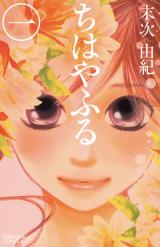Chihaya is a girl in the sixth grade, still not old enough to even know the meaning of the word zeal. But one day, she meets Arata, a transfer student from rural Fukui prefecture. Though docile and quiet, he has an unexpected skill: his ability to play competitive karuta, a traditional Japanese card game.
Chihaya is struck by his obsession with the game, along with his ability to pick out the right card and swipe it away before any of his opponents. However, Arata is transfixed by her as well, all because of her unbelievable natural talent for the game. Don't miss the first volume in this story of adolescent lives and emotions playing out in the most dramatic of ways. (From Kodansha USA)
Original Comic
Official English: INKR
Note: Won the 2nd Manga Taisho Award and the 35th annual Kodansha Manga Award for Best Shoujo. Was nominated for the 20th Tezuka Osamu Cultural Prize in 2016.
50 Volumes (Complete)





